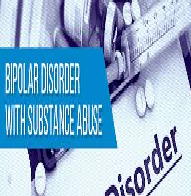Bipolar Disorder and Young Adults Order Instructions: Topic: Bipolar Disorder and Young Adults
Scenario: A 19-year-old college student has been admitted to the Mental Health Unit with a new diagnosis of Bipolar Disorder.

During a meeting, the family asks what caused this problem, since nobody else in the family has the disorder. The family says that they do not want their relative “drugged up” by being given psychiatric medications since they have heard negative reports about side effects of these medications.
After reading the following textbook pages listed below, address the following & Answer the following questions:
1-Based on your readings and knowledge, discuss what the RN would teach the client and family about Bipolar Disorder.
2-Would the RN need to make any adjustments in the teaching based on this client’s patient’s age? If so, explain.
3-Discuss how the RN would respond to the family’s desire not to have the client take any medication.
Requirements & Attention to the writer, Make sure the following is accomplished with this paper:
1-Please focus on answering the questions and supporting your answers with the evidence.
2-Once you have thoroughly completed this objective expand on the subject a little
3-Please support the intervention directly.
4- APA style
5-1 pages long 275 words Minimum or more.
6- Provide 2 citations, one from either textbook listed below.
Thanks for your attention to the requirements and details. Questions let me know.
Bipolar Disorder and Young Adults Required Materials
Textbooks (Chapter numbers and titles may differ in subsequent editions of a given textbook. If your edition is different, use the Table of Contents in the textbook to locate the appropriate chapters to read):
Kee, J., Hayes, E., & McCuistion, L. (2015). Pharmacology: A nursing process approach (8th ed.). Philadelphia, PA: Elsevier.
Nursing Diagnosis Guidebook – A pocket-size nursing diagnosis guidebook of your choice that is no more than one edition old, that includes NANDA International-approved nursing diagnoses, definitions, defining characteristics, and possible nursing Interventions.
Pillitteri, A. (2014). Maternal and Child Health Nursing (7th ed.). Philadelphia, PA: Lippincott Williams & Wilkins.
Townsend, M.C. (2015). Psychiatric Mental Health Nursing: Concepts of Care in Evidence-Based Practice (8th ed.). Philadelphia, PA: F.A. Davis Company.
Required: Textbooks and chapters to focus on:
Pharmacology**
• Chapter 20: Central Nervous System Stimulants
• Chapter 27: Antipsychotics and Anxiolytics
• Chapter 28: Antidepressants and Mood Stabilizers
Nursing Diagnosis
• Use your chosen Nursing Diagnosis Guidebook to review the nursing diagnoses specific to the content covered in this module.
Maternal and Child Health Nursing**
• Chapter 54: Nursing Care of a Family When a Child Has a Cognitive or Mental Health Disorder
Psychiatric Mental Health Nursing**
• Chapter 13: Crisis Intervention
• Chapter 17: The Suicidal Client
• Chapter 20: Electroconvulsive Therapy
• Chapter 25: Depressive Disorders
• Chapter 26: Bipolar and Related Disorders
Web-Based and Other Professional Resources:
• Suicide assessment and nurses: What does the evidence show? (2015)**
• Care of the suicidal pediatric patient in the ED: a case study (2011)**
Bipolar Disorder and Young Adults Sample Answer
BIPOLAR DISORDER AND YOUNG ADULTS
Bipolar disorder is a brain disorder also known as the manic-depressive illness that causes the shifts in ability, moods and activity levels. The RN makes the positive contributions to the patients and their families through teaching about physical care, psycho-education and relapse prevention. The RN develops knowledge of the bipolar disorder (Kee et al, 2015). The RN teaches the patient common signs and symptoms of the disorder as well as the treatment options available for managing the conditions effectively. The patient and the family are educated on the risk factors that lead to the disorder. The education makes them aware of other risk factors such as brain structure and functioning apart from family history and genetics which are the main factors they understand to cause the bipolar disorder (Townsend, 2015). The psychotherapy is also taught by RN, which is a combination of talk therapy and medication. The education essentially guides the patients and families living with the disorder (Kee et al, 2015). Adjustment during the teaching process of the patients and families about the bipolar disorder is essential where the factor is considered. The patients should be educated that the disorders occur with a growing frequency among the young ages thus it is vital for young people e.g. the 19 years old college student to ensure they keep a life chart as they are vulnerable to suffer from bipolar disorder. The young people e.g. the student in the case study have a tendency to develop the disease which also involves the environmental factors.
It is important for the RN to respond appropriately to the family of the patient on the matter of medication. Awareness of the importance of the medication shall be enhanced among the family and the patient by highlighting the treatment options and therapies available for the disorder (Kee et al, 2015). The RN also notifies the family about the type of bipolar disorder management that works best for the particular patient. If the family are totally against the medications and drugs used by bipolar disorder patients, Electroconvulsive Therapy (ECT) can be suggested to them as they consider taking other medications risky (Townsend, 2015). The primary responsibility of the RN is to ensure the patient and his family see the positive side and impact of the treatment rather than the few side effects that result after medication (Kee et al, 2015).
Bipolar Disorder and Young Adults Reference
Kee, J., Hayes, E., & McCuistion, L. (2015). Pharmacology: A nursing process approach (8th ed.). Philadelphia, PA: Elsevier.
Townsend, M.C. (2015). Psychiatric Mental Health Nursing: Concepts of Care in Evidence-Based Practice (8th ed.). Philadelphia, PA: F.A. Davis Company




